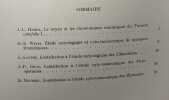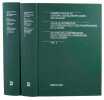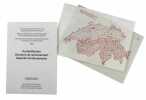-
Type
Book (8100)
Engraving (1)
Magazine (50)
Photographs (1)
-
Latest
Last 24h (1)
Last 3 days (2)
Last month (30)
Last week (4)
-
Language
Dutch (4)
English (15)
French (8118)
German (2)
Italian (2)
Japanese (2)
Latin (5)
Polish (1)
Portuguese (1)
Russian (1)
Spanish (1)
-
Century
16th (9)
17th (21)
18th (289)
19th (1523)
20th (3457)
21st (363)
-
Countries
Belgium (163)
Canada (31)
China (2)
Côte d'Ivoire (25)
Denmark (363)
France (6615)
Italy (213)
Switzerland (740)
-
Syndicate
ALAC (31)
CLAM (10)
CLAQ (29)
CNE (3)
ILAB (3650)
NVVA (263)
SLACES (263)
SLAM (2744)
SNCAO (23)
Über einen im Zahnbein und Knochen keimenden Pilz.
1864 23 p., 1 folded lithographed plate, disbound (no covers). Unopened copies. Published in: Sitzungsberichte der Kaiserlichen Akademie der Wissenschaften. Scarce.
Les serres Royales de Laeken - huit planches de Margot Weemaes avec une introduction historique architecturale et botanique
Donation Royale 1981 in8. 1981. Broché.
livre et planche en très bon état de conservation intérieur très frais chemise défraîchie ternie
A biologic and Phylogenetic Study of the Stromatic Sphaeriales.
AMERICAN JOURNAL OF BOTANY. 1926. In-8. Broché. Etat d'usage, Couv. légèrement passée, Coiffe en tête abîmée, Intérieur frais. Paginé de 575 à 645. Ouvrage en anglais. Coiffe en pied légèrement abîmée.. . . . Classification Dewey : 580-Botanique
Classification Dewey : 580-Botanique
Cultural Life-Histories of Diaporthe I*
PAPERS OF THE MICHIGAN ACADEMY OF SCIENCE. 1926. In-12. En feuillets. Bon état, Couv. convenable, Dos satisfaisant, Intérieur frais. Paginé de 377 à 396. Quelques planches de photos et d'illustrations en noir et blanc hors-texte. Pas de plats de couverture. Ouvrage en anglais.. . . . Classification Dewey : 580-Botanique
Classification Dewey : 580-Botanique
Further cultural life histories of the stromatic sphaeriales.
AMERICAN JOURNAL OF BOTANY. 1926. In-8. Broché. Etat passable, Couv. légèrement passée, Dos abîmé, Intérieur bon état. Paginé de 231 à 246. Quelques planches de photos et d'illustrations en noir et blanc hors-texte. Dos fendus. Feuillets volants. Ouvrage en anglais.. . . . Classification Dewey : 580-Botanique
Classification Dewey : 580-Botanique
Melanconis and Pseudovalsa.
NON INDIQUE. Non daté. In-12. En feuillets. Bon état, Couv. convenable, Dos satisfaisant, Intérieur frais. Paginé de 259 à 272. Quelques planches d'illustrations et de photos en noir et blanc hors-texte. Pas de plats de couverture. Ouvrage en anglais.. . . . Classification Dewey : 580-Botanique
Classification Dewey : 580-Botanique
Studies on the rôle of the host in the genus diaporthe
PAPERS OF THE MICHIGAN ACADEMY OF SCIENC. 1930. In-8. En feuillets. Bon état, Couv. convenable, Dos satisfaisant, Intérieur frais. Paginé de 309 à 328. Quelques planches d'illustrations en noir et blanc hors-texte. Pas de plats de couverture. Ouvrage en anglais.. . . . Classification Dewey : 580-Botanique
Classification Dewey : 580-Botanique
The perfect stage of the Valsaceae in culture and the hypothsis of sexual strains in this group.
PAPERS OF THE MICHIGAN ACADEMY OF SCIENC. 1924. In-12. En feuillets. Bon état, Couv. convenable, Dos satisfaisant, Intérieur frais. Paginé de 395 à 413. Une planche d'illustrations en noir et blanc hors-texte. Pas de plats de couverture. Texte en anglais.. . . . Classification Dewey : 580-Botanique
Classification Dewey : 580-Botanique
Vegetation of Guizhou.
1988 4, 3, 502 p., 51 figs, 16 col. pls, hardbound (dust jacket). In Chinese. With author's dedication.
Untersuchungen über die Entwicklungsgeschichte des Farbstoffes in Pflanzenzellen.
1866 61 p., 4 col. (1 folded) lithographed pls, disbound (no covers). Unopened copy. Published in: Sitzungsberichte der Kaiserlichen Akademie der Wissenschaften. Last page in photocopy.
Untersuchungen über die Entwicklungsgeschichte des Farbstoffes in Pflanzenzellen.
1864 36 p., 3 col. lithographed pls, disbound (front cover of journal present). Unopened copy. Published in: Sitzungsberichte der Kaiserlichen Akademie der Wissenschaften.
Contribution à la caryologie de quelques végétaux cultivés dans les serres du muséum essais de caryo-taxinomie / Mémoires du muséum national d'Histoire naturelle
Éditions du Muséum / Paris 1965 in4. 1965. Broché.
Bon état intérieur propre pages non-coupées 2e plat taché
Das Herbarium curiosum der Heilpflanzen.
Zürich, Ingo von Oppersdorff Verlag, 1978, in-Folio, 4 Bl. (Kollophon, 2 Bl. Text u. Tafelbeschreibung + 1 Blatt mit 16 s/w. Abb. d. Tafeln + 16 farbigen Tafeln, jeweils in Papier-Umschlag mit Titel, (numm. 1 bis 16), planches non reliées dans un cartable en toile verte. Lanières.
Image disp.

(SLACES, NVVA)
Phone number : 41 (0)26 3223808
Alpen-Azalee, Alpenheide Loiseleuria procumbens (L.) Desv. / Alpen-Aurikel Primula auricula L. / Urspringswerk: WEISZ, Josef, Blumen der Alpen. N° 3,
(Leipzig & Wiebaden), Insel, 1960, 31.5 x 23.5 cm. (35 x 44.5), Die Herausgabe dieser prächtigen Pflanzenholzschnitte wurden bereits 1938 durch Anton Kippenberg veranlasst. Fritz Arnold druckte die ersten 48 Holzschnitte noch während des Krieges, aus der er nicht zurück kam. 1947 druckte Weisz selbst, das Werk wurde 1960 durch den Insel Verlag verlegt. O.-Umschlag + 1 handkolorierte Original-Holzschnitt.
Urspringswerk Weisz, Josel, Blumen der Alpen Tafel 3. Image disp.

(SLACES, NVVA)
Phone number : 41 (0)26 3223808
Blumen der Berge. Kolorierte Holzschnitte und text von Josef Weiss.
Konigstein, 1959, grand in 8° broché, 64 pages ; jquette illustrée.
Illustré de 48 planches hors-texte en couleurs.Collection "Die Blauen Bücher".PHOTOS sur DEMANDE. ...................... Photos sur demande ..........................


Phone number : 04 77 32 63 69
Bulletin of The Research Council of Israel. Section D. Botany
WEIZMAN SCIENCE PRESS OF ISRAEL. 1961. In-8. Broché. Bon état, Couv. légèrement passée, Dos satisfaisant, Intérieur frais. 355 pages. Nombreuses illustrations, photos et quelques cartes en noir et blanc dans le texte et en planches hors-texte. Ouvrage en anglais.. . . . Classification Dewey : 580-Botanique
Volume 10 D, Nos 1-4. Dedicacé au Pr Tscharna Rayss pour ses 70 ans. Classification Dewey : 580-Botanique
Über die spät- und postglaziale Vegetationsgeschichte des Simmentals. "Veröffentlichungen des Geobotanischen Institutes Rübel in Zürich", 26. Heft.
Bern, H. Huber, 1952, gr. in-8vo, 135 S., ill. + 2 Abb., Original-Broschüre.

(SLACES, NVVA)
Phone number : 41 (0)26 3223808
Verbreitungsatlas der Farn- und Blütenpflanzen der Schweiz. Atlas de distribution des pteridophytes et des phanerogames de la Suisse. In 2 vols. German / French / Italian.
Basel, Birkhäuser, 1982, in-4to, 716 S., ill. / 698 S., ill., mit ca. 2572 Karten, Original-Leinenband, Schuber.
Image disp.

(SLACES, NVVA)
Phone number : 41 (0)26 3223808
Guioa Gav. (Sapindaceae): taxonomy, phylogeny, and historical biogeography.
1989 315 p., 129 figures, paperbound. Leiden Botanical Series, Volume 12. New copy.
Obstbau für Siedler und Kleingärtner.
Berlin-Schildow, Falken-Verlag Erich Sicker, o.J. (um 1935). 8°. 125 (1) S. Mit 49 Abb. im Text und mehreren Tabellen. Illustr. Orig.-Broschur (leicht berieben und bestossen, Rücken verblichen und fleckig). = "Falken-Bücherei", Band 25.
Ericarum icones et descriptiones - fascicul. II : Abbildung und Beschreibung der heiden - 2. heft
Hannover, bev des Gebrüdern Hahn, 1798. Fascicule in/4 à grandes marges en couverture d’attente, 6 planches aquarellées du temps, 30 p. 1f. Feuillets et planches en excellent état. Belle fraîcheur des coloris.
L’ensemble des fascicules édités de 1798 à 1823, comptait 162 planches colorées. Pritzel 11158. Les présentes planches représentent : Erica Taxifolia, Erica Plukenetii interupta, erica laniflora Schmidt, eric strigosa ait, erica spicata, erica bergiana.
Les plantes
"Time LIFE. 1968. In-4. Cartonné. Bon état, Couv. convenable, Dos satisfaisant, Intérieur bon état. 193 pages. Coiffes légèrement frottées. Ouvrage illustré de nombreuses photos en noir et blanc et en couleurs, dans et hors-texte. Collection ""Le monde vivant"".. . . . Classification Dewey : 580-Botanique"
Classification Dewey : 580-Botanique
Cicutae aquaticae historia et noxae.
Basel, Joh. Rodolph König, 1679. Gross-8°. 10 n.n. Bl. 336 S., 3 n.n. Bl. Index und 1 S. Errata. Mit 4 ganzseitigen Holzschnitten. Neuer Pappband.
Nissen BBI 2136. - Krivatsy 12949. - Garrison-M. 974.1. - Waller 10219. - Erste Ausgabe. Beschreibt die Anwendung und Behandlung mit der Cicuta virosa L. und anderen Pflanzen. Die erste umfangreiche Beschreibung dieser Giftpflanze u.a. "Wepfer showed that the heart and structure of the viscera were changed by the administration of poisons" (HOH). - Unser Exemplar ohne das gestochene Frontispiz. Titel gestempelt. Papier leicht gebräunt und fleckig.
La flore. Dessins de Sabine Rey et Françoise Burri. Collection Connaître la nature en Valais 2.
Martigny, Editions Pillet 1988, 230x170mm, 259pages, broché. Bel exemplaire.
photos couleurs et n/b, Pour un paiement via PayPal, veuillez nous en faire la demande et nous vous enverrons une facture PayPal
 Write to the booksellers
Write to the booksellers
















